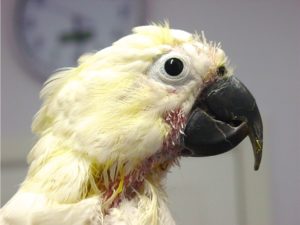Signs of Illness and Disease in Pet Birds
Pet birds can be wonderful companions and enjoyable pets for all members of the household. Birds are not hard to keep as pets, but do require specific types of housing, care and nutrition in order to thrive and live long, healthy lives. Just like any pet, birds can become ill or depressed. Some signs of illness in pet birds are:
Lack of personal grooming
Constantly fluffing feathers
Tail bobbing
Weakness or inability to perch
Unusual discharge eye/nose/feces
Inability to make usual sounds
Floor walking
Skin lesions, sores or warts
Chlamydiosis in Pet Birds
There are many diseases that affect pet birds. Some diseases are zoonotic and are required to be reported and treated as stated by law, and can be dangerous to bird handlers. One of the more common zoonotic diseases shared between birds and humans is Chlamydiosis. This disease is easily treated by antibiotics (any humans in contact with the bird will need to be treated as well) but can be fatal if left untreated.
Fungal and Yeast Infections in Pet Birds
Fungal infections in pet birds are often caused by the Aspergillus species. One symptom that suggests a bird may have a fungal infection is the inability of the pet bird to make his usual noises or sounds. Sometimes a small localized mass may be found at the base of the trachea when viewing radiographs of birds with fungal infections.
Another common disease found in younger or immuno-suppressed birds is yeast. Sometimes bird owners will notice a musty or rancid odor coming from the mouth or nasal area of their pet bird. An avian veterinarian will take a swab of the affected area and can identify the yeast under microscopic examination. Both fungus and yeast are easily treated with prescription medicine from the veterinarian’s office.
Psittacine Beak and Feather Disease
PBFD is a serious virus that can exist in seemingly healthy birds for years without outward signs, and is very infectious. This disease can be devastating in breeding flocks and currently there is no treatment for the virus. Some signs of this disease include sudden feather picking, beak deformity, and deformed feather growth. Any birds with these symptoms should be tested immediately.
Nutritional Deficiencies Causing Illness in Pet Birds
Nutritional deficiencies are usually related to poor-bird keeping habits of owners. Vitamin A deficiency is caused by seed only diets and can be corrected by proper diet and Vitamin A supplementation until the bird recovers. Signs of Vitamin A deficiency include poor quality feathers and skin, and sometimes foot sores or lesions are present.
Hypocalcemia is a lack of calcium (or too much phosphorus) in the diet and can be recognized by symptoms such as seizures, inability to perch, and sometimes hens become egg bound. Again, this problem can be corrected by changing the bird’s diet to contain a more appropriate calcium and phosphorus ratio appropriate to the species.





